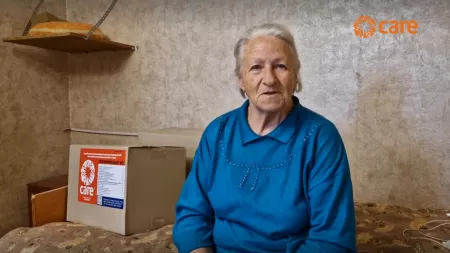As the security situation in The East of Ukraine deteriorates, older people – especially those with disabilities – are increasingly at risk. A significant proportion of the population within 25 kilometers of the front line consists of older people and those with disabilities, with approximately 20-25% being elderly and 10-12% having disabilities. However, front-line workers report that the actual number of older people may be as high as 50%, as many elderly are often the last to evacuate, reluctant to leave their possessions and fearful of adapting to new environments.
"We were afraid to leave because my husband and I are both people with limited mobility - we were afraid we would be left alone and without support.”Inna, internally displaced person from Vovchansk, Ukraine
“When people started to leave, we were afraid to leave because me and my husband are both people with limited mobility, both with disabilities, and we were afraid that we would not be able to socialize in the big city, that we would be left alone and without support,” Inna, an internally displaced person from Vovchansk whom CARE met at a transit point in Dnipro, told us.
On 1 of October, the International Day of Older Persons, CARE calls for attention to the vulnerable situation of older people in Ukraine, and for increased support. With the conflict continuing to put lives at risk, older people in Ukraine require immediate and specific assistance to ensure their safety, health, and dignity. The war has significantly limited access to life-sustaining resources for this group, including pensions, healthcare, and humanitarian aid. People with disabilities and chronic illnesses are among the most vulnerable, and many are unable to leave dangerous areas due to physical limitations or lack of access to transportation and inclusive shelter.
"When we are talking about people with limited mobility, there is also a lack of medical specialists who must accompany such evacuation missions,"Taras Kravets, Assistant Project Manager at CARE partner organization, Angels of Salvation
“Evacuating and supporting older people from the frontline areas is always a difficult task. They often stay in dangerous areas until the very end. There are many reasons for this, including attachment to home, fear of the unknown, as most of them have never left their regions, and lack of information about free evacuation services and shelters for evacuees. If we are talking about people with limited mobility, there is also a lack of medical specialists who must accompany such evacuation missions and specialized transport that will ensure comfortable conditions. That is why we plan such missions very carefully, conduct large-scale advertising campaigns to raise awareness, and send our best specialists to the mission” - said Taras Kravets, assistant project manager at the CARE partner organization, Angels of Salvation.
"This is especially important in a country where one in four people is over the age of 60."Franziska Jörns, Deputy Сountry Director, CARE Ukraine
CARE’s Response in Ukraine
CARE's programs in Ukraine continuously consider the vulnerabilities and needs of older people. In 2023, 97,831 people aged 60+ received assistance from CARE, which is 29% of all program participants. The assistance included comprehensive support ranging from organizing evacuation missions to improving living conditions in collective centers, providing financial assistance and distributing customized hygiene kits. It is important to note that during the evacuation from the frontline areas, the percentage of people aged 60+ is 40% of the total number of evacuees (1471 out of 3731 people).
"When designing our programs in Ukraine, CARE maintains a strong focus on vulnerable groups, with older people always at the forefront. This is especially important in a country where one in four people is over the age of 60. Together with our partner organizations, we are committed to ensuring their safety and dignity by providing tailored support, from evacuation to improving living conditions and offering financial assistance,"- said Franziska Jörns, Deputy Сountry Director at CARE Ukraine.
For media inquiries, contact Halyna Bilak, Communication Coordinator, CARE Ukraine: [email protected]
